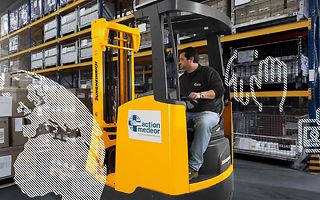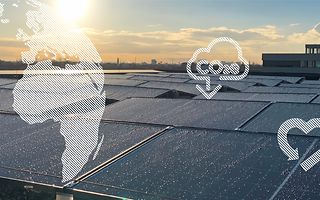Purchasing at Jungheinrich
In 2023, the Jungheinrich Group's purchasing volume increased to €3,215 million (prior year: €3,118 million). It can be divided into production materials, including post-production materials, merchandise and indirect materials and services.
All sourcing demands are generally managed by the groupwide commodity group management system. A long-term procurement strategy adhering to the principles of sustainability ensures cost-optimized purchasing conditions. This approach is underpinned by well-founded cost engineering and holistic cost assessments. Above and beyond this, resolute, crossfunctional collaboration on all development and sourcing processes unleashes savings potential across the entire value-added chain.
The top-selling commodity groups were batteries, warehouse equipment, steel components, electric drive trains and logistics services.
Purchasing controlling
Purchasing controlling is a priority at Jungheinrich. The centrepiece of purchasing controlling is the purchasing cockpit in which all relevant key figures are collected. It is based on SAP-BI (Business Intelligence) and SAP-BW (Business Warehouse) and builds a bridge from strategy development to the measurement of implemented measures and results.
The core element of reporting is the change in the cost of materials, a key figure that reflects the impact of earnings on the income statement. The effects on prices of external factors such as changes in foreign exchange rates and commodities are also measured and taken into account when making purchasing-related decisions.
Cost Engineering
In recent years, the identification of cost advantages and their realization across various product lines has been made possible in particular by close cooperation and early integration of purchasing and cost engineering into the product development process. To this end, the Cost Engineering department has been consistently expanded in recent years and the use of well-founded methods and instruments has been strengthened. The approach of a holistic cost consideration in the sense of the "Total Cost of Ownership" over the entire value chain and the life cycle of a product leads to a consistent target cost optimization.
Your ideas and innovations
Interested in showing Jungheinrich an innovative product that gives us — as the leading mechanical engineering enterprise for industrial trucks, warehouse and material flow technology — more of a competitive edge? If so, please contact us. We are open to innovations in the area of material handling.
Present your innovative product and seize the opportunity to convince us your innovation will add value for our customers and is capable of being integrated in the Jungheinrich product line.
Under the influence of our founder Dr Friedrich Jungheinrich, the company has developed a unique corporate culture that, through to this day, characterises the business activities and inter-staff relationships at Jungheinrich. In contrast to many companies which in the Fifties and Sixties were marked by top-down, strictly hierarchical management styles, Dr Friedrich Jungheinrich was already practicing dialogue. He delegated responsibility, gave his staff leeway at work and supported and promoted entrepreneurial thought and action. In those days the phrase that jokingly made the rounds at Jungheinrich was that the chief rule of management was “Get it done!” Today, too, these are the best preconditions for technical innovation and excellent products.
Like our company founder, we offer you round table talks characterised by fairness and full respect for your intellectual property. Jungheinrich is well known for its innovative products and curious to get to know your new ideas.
Downloads
Supplier Download Center
As a current supplier for Jungheinrich, please visit our supplier download center and learn about the latest updates and plant-specific information.
Learn more



